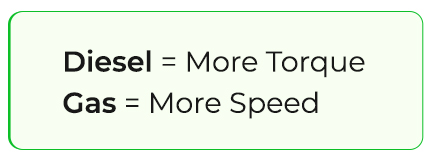Diesel vs. Gasoline: Choosing the Right Fuel for Your Commercial Fleet

When it comes to the operation of your commercial fleet, one of the most crucial decisions to make is the selection of fuel, which can influence the cost of running the business, as well as its future profitability. The issue of diesel vs gas depends on the knowledge of the advantages and disadvantages of the fuel type. Although diesel trucks can be more expensive in the initial investment, they are much more fuel-efficient and durable, particularly when the workload is heavy. Gas trucks, on the contrary, are cheaper to purchase over time and maintain, and therefore are appealing for minor tasks.
Diesel vs gas trucks in each case have their own pros and cons depending on your routes, loads, and fleet size. Diesel fuel is more expensive, and the question arises: Why is diesel more expensive than gas? The solution is to optimize procedures and regulatory expenses. Nonetheless, diesel also has a higher energy content and torque, which can be a desired feature, resulting in better mileage and longer vehicle life, so it is preferred in fleets with heavy loads or with a high traveling range. Take practical feedback of fleet and real-time operations data to inform your decisions and ensure that your trucks are operating best at the least possible costs.
What’s the Difference Between Diesel and Gas?
Commercial fleets should understand the difference between diesel and gas as part of the diesel vs gas debate. Diesel is more viscous, less refined, and has approximately 20% more energy per gallon than gasoline. This increased energy density causes diesel engines to generate more torque at lower RPMs and is ideal in heavy hauling and long-distance trucking. Gasoline, on the other hand, burns faster and ignites with a spark, offering more horsepower and acceleration but less torque.
The frequently asked question amongst fleet owners is, Why is diesel more expensive than gas? Its refining process, taxes on regulation, and increased energy content provide the answer. Diesel is more expensive, but the economy is usually countered by the initial difference in price over the long run.
Real-world feedback from operators like Jack Reynolds emphasizes that choosing between a diesel vs gas truck depends on workload:
“Diesel trucks handle big loads better, but gas trucks save money on lighter city routes.”
For fleets that prefer the most fuel-efficient truck models and reduced downtime, it is important to know these variations in fuel to make a cost-effective decision.
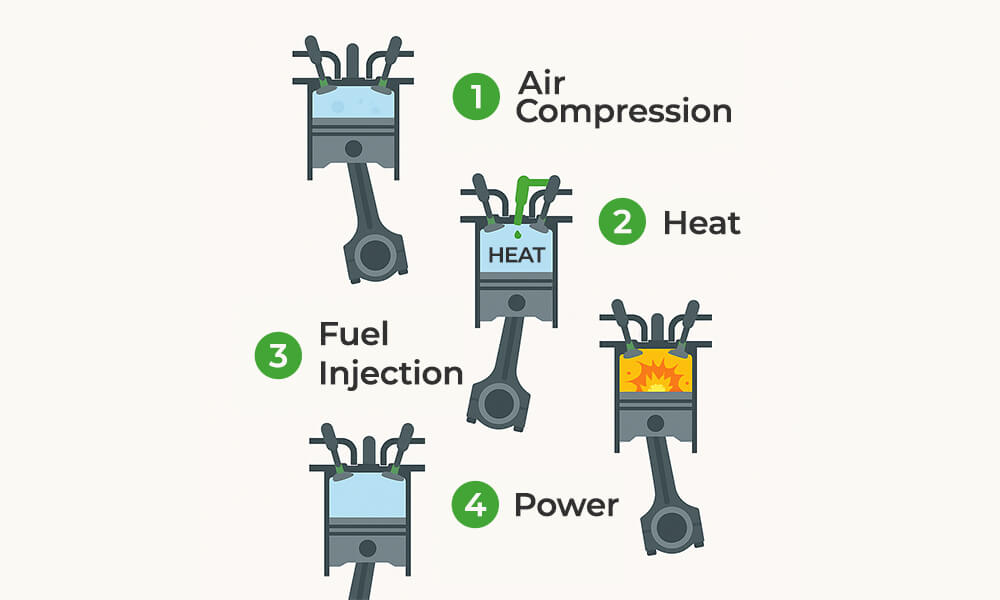
How Diesel Engines Work
The diesel engines operate on a compression ignition system without spark plugs like gasoline engines. They instead squeeze air in the cylinder, increasing its temperature by a large margin. Diesel fuel is then injected into this hot compressed air, and it burns straight away through the high temperature. This action creates a high-powered combustion that causes the piston to be pushed down, producing a forcing torque of heavy-duty work in a commercial fleet.
Fleet manager Mike Thompson describes his experience:
“Diesel engines deliver strong, consistent power thanks to their unique compression ignition process. This design keeps my trucks running efficiently, especially when hauling heavy loads over long distances.”
This principle of functioning enables diesel engines to be more economical in fuel consumption and deliver longer durations in operation as opposed to gas engines. These mechanics go a long way toward explaining why diesel is more expensive than gas, yet it often justifies the price to many fleet operators with a mix of heavy and long-haul routes. To fleet operators who handle fleet diesel vehicles, combining this knowledge with tips on heavy-duty truck transmissions can further enhance the performance of your trucks and keep them on the road.
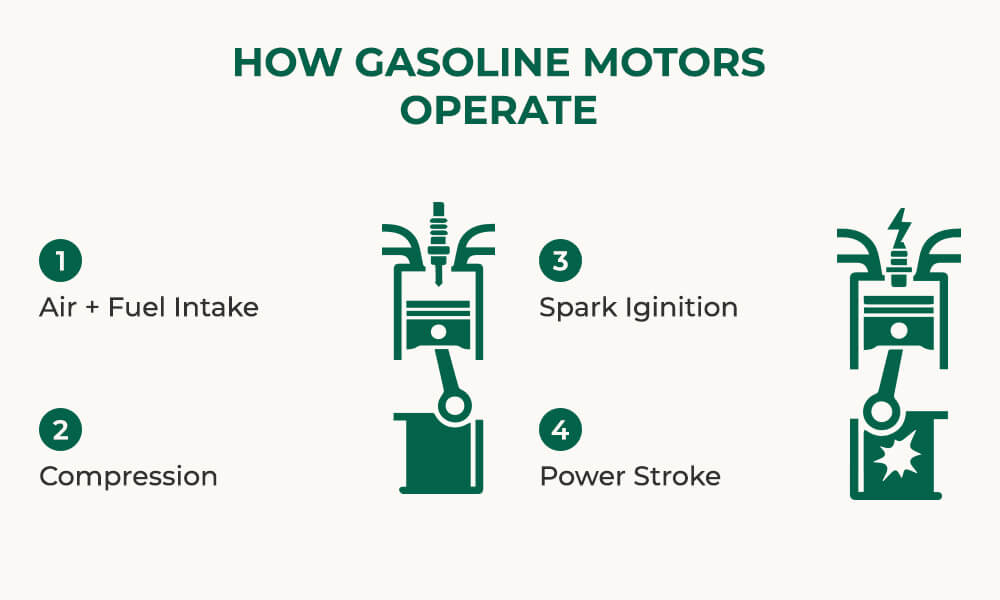
How Gasoline Motors Operate
Gasoline engines have a spark-ignited combustion engine. They pull a mixture of air and fuel into the cylinder, compress it, and ignite it using a spark from a spark plug. This ignites a controlled blast that causes the piston to thrust down, which produces an impetus to propel the vehicle. This process is repeated many times, producing the horsepower and speed that gas engines are famous for.
Fleet operator Sarah Lopez shares her insights:
“Gas trucks have simpler engines with spark ignition, which makes maintenance easier and often cheaper. They’re great for city routes where quick acceleration matters more than heavy torque.”
The initial cost and maintenance of a gasoline engine are usually lower and less complicated than those of a diesel engine. Nevertheless, to comprehend the difference between diesel and gas, we need to take a closer look at why diesel trucks are widely used when it comes to carrying heavy cargo, even though they consume more fuel and maintenance. For fleet managers, selecting truck fuel efficiency and service options such as mobile fleet maintenance services may enable them to manage the practical consequences of each type of engine.

Gas vs. Diesel: Fuel Efficiency
The next big consideration of the current diesel vs gas debate is fuel efficiency. Diesel engines are more economical than gasoline engines, and in many cases, diesel engines get 20-35% more miles per gallon. The reason is that diesel fuel has a greater energy density, such that fleet trucks that use fleet diesel can travel over a longer distance with less fuel usage. The compression ignition system of diesel engines also burns their fuel more slowly and efficiently. Fuel economy: Since fleets that travel long distances and carry heavy loads consume more fuel, the high fuel economy of diesel could save the company a lot of money in the long run.
Nonetheless, this benefit may vary according to use. Gasoline engines will generally work better on shorter trips, urban driving, and on light loads, where stop-and-go dynamics decrease the efficiency advantage of the diesel.
Fleet manager John Miller notes:
“While diesel trucks save on fuel for our long hauls, some of our routes with local deliveries run smoother with gas trucks because of the lower upfront fuel costs.”
To those who want to optimize fuel consumption, it is essential to learn about this balance in the diesel vs gas truck comparison. Making truck selection in accordance with fleet fuel efficiency tips can improve the performance and cost-effectiveness of your commercial fleet.

Gas vs. Diesel: Torque/Horsepower
Torque and horsepower are important performance indicators to be familiar with when comparing diesel vs gas. Diesel engines usually make a lot more torque at a lower RPM than gasoline engines. This implies that diesel trucks are efficient in transporting heavy loads, towing, and climbing steep grades. High low-end torque makes fleet diesel suited to hard fleet tasks where power and longevity matter.
Fleet manager Mike Thompson remarks,
“Our diesel trucks have the torque we need to pull heavy loads efficiently, which regular gas trucks just can’t match.”
Gas engines are, on the other hand, typically more powerful and accelerate faster at higher RPMs, suitable for accelerating speed, quick start, and lower weight. Gas trucks can be used in any application that needs on-road maneuvering and acceleration instead of the maximum weight pull.
The awareness of these differences can guide you to select the appropriate type of fuel to use in your particular trucking requirements. The right engine paired with the heavy-duty truck transmissions would give the maximum power and efficiency to your truck.

Gas vs. Diesel: Towing Power
Towing power is one factor that plays a significant role in the diesel vs gas argument. Diesel trucks usually provide significantly more towing power than gas trucks because of the higher torque and engine design. This puts the diesel trucks at an obvious advantage in the case of the transport of heavy trailers or equipment. Diesel engines can run at lower RPMs, and thus they offer better controls and durability under heavy load conditions, hence they are suitable for demanding operational commercial fleet services.
Gas trucks, which are lighter in many cases and have a high payload capacity, tend to have less torque and hence lower towing capacity than diesel trucks. They are more appropriate in lighter, daily towing work and are usually selected because of their lower purchase price and ease of maintenance.
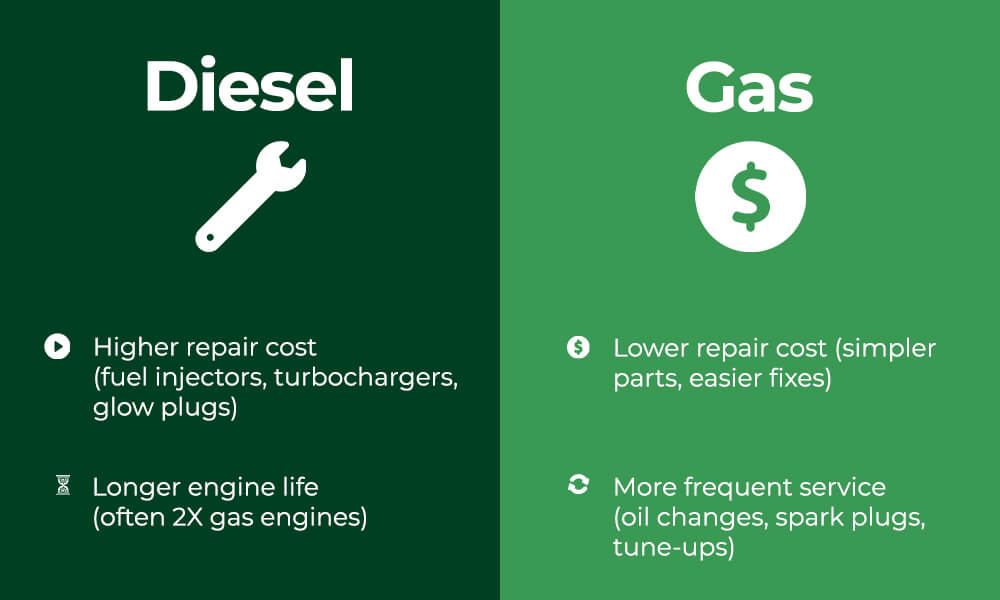
Gas vs. Diesel: Maintenance
Maintenance is one of the key factors that commercial fleets consider in the diesel vs gas debate. Most diesel engines also tend to be very costly in terms of maintenance as they have sophisticated fuel injection pumps, glow plugs, and turbochargers. Such specialized components may be much more expensive to maintain or replace than gasoline engines. Nevertheless, diesel engines can be longer lasting, and in many cases, they are twice as durable as gas engines, and these high maintenance expenses can be compensated in the long run. This is one of the reasons why is diesel more expensive than gas, not only at the pump but also in maintenance.
Fleet operator Mike Thompson explains:
“Our diesel trucks have higher repair bills, especially for fuel injectors and turbochargers. But because they last much longer and deliver better fuel efficiency, the maintenance cost balances out in the long run.”
Gasoline trucks tend to be cheaper per service and easier to repair, but they need more frequent service, such as oil changes and spark plugs. This would make gas trucks less expensive to fleets with shorter routes or lighter loads. In order to have control over your maintenance costs, a balance in diesel vs gas maintenance costs will allow you to have an efficient cost of ownership on your commercial fleet.
How important is fuel when choosing commercial fleet vehicles?
The fuel is also one of the most important aspects in selecting vehicles that make a commercial fleet and has a strong impact on the operational costs and efficiency. Going back to the debate of diesel vs gas, the evaluation of fuel cost can assist the fleet managers in maximizing their expenditure and performance. Diesel fuel is typically a more expensive choice in the short run, and many people will question, Why is diesel more expensive than gas? More fuel-efficient, particularly on long, heavy routes, diesel engines are usually cheaper in the long run despite the increased expense of the pump. To maximize ROI, it is necessary to balance the fuel expense and durability, and maintenance of the truck.
Fleet manager Jack Reynolds explained:
“Fuel makes all the difference. For our long-haul trucks, investing in diesel clearly pays off with fewer refills and better mileage. But for local deliveries, gas trucks keep our costs steady.”
Beyond price, fuel type impacts environmental compliance, maintenance schedules, and resale value. Efficient fuel usage, together with smart vehicle choice and fleet maintenance services such as mobile fleet maintenance, ensures smooth operations.
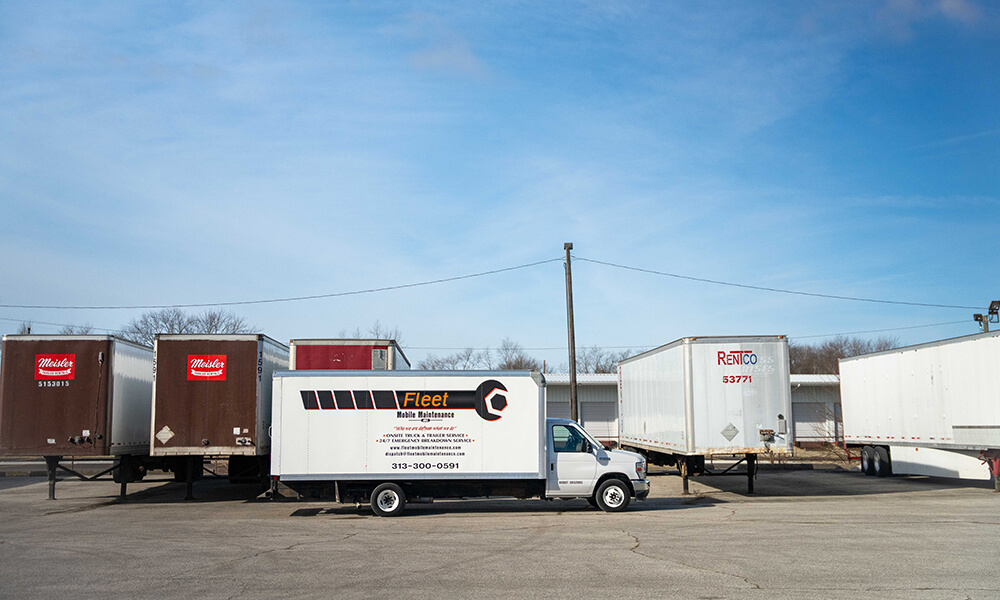
Making Choices for Your Truck Fleet
Choosing between diesel vs gas for your truck is about balancing operation, cost, and long-term gains. Begin with a comparison of what your trucks will do. Diesel is normally the best option for heavy and long haul due to its better torque and fuel economy, although diesel is costly compared to gas in the initial period. On the contrary, gas trucks may prove to be affordable in urban routes and less weighty loads, wherein upkeep and fuel costs are minimal.
In addition to fuel prices, consider the difference between diesel and gas in regard to maintenance, complexity of repair, and overall cost of ownership. Streamlining your fleet to concentrate on either diesel-powered or gas-powered trucks can save you on management costs as well as operational efficiency. To the people who operate commercial fleets, venturing into smart services such as professional truck repairs and learning from the most common fleet accidents can provide a competitive edge.
FAQs
Which is better, gasoline or diesel?
Diesel is better for heavy-duty hauling and long-distance driving due to higher torque and fuel efficiency. Gasoline trucks are typically cheaper upfront, offer quicker acceleration, and are better for lighter loads and city driving. The best choice depends on your fleet’s specific use. For commercial fleets, understanding the diesel vs gas difference is essential to optimize the cost of owning a diesel truck vs a gas truck.
What are the disadvantages of diesel?
Diesel trucks generally have higher purchase prices and often come with increased diesel vs gas maintenance costs. Repairs can be more expensive due to complex engine components like turbochargers and fuel injectors. Diesel fuel is also pricier at the pump. When thinking about diesel vs gas truck cost of ownership, these expenses are important to consider.
What’s the difference between gas and diesel trucks?
The main difference between diesel and gas trucks lies in engine operation and fuel type. Diesel engines use compression ignition and produce higher torque, ideal for towing and heavy hauling. Gas trucks operate with spark ignition and deliver higher horsepower, suited for lighter loads with faster acceleration. Gas trucks typically have lower upfront costs and maintenance but consume more fuel. Choosing between a gas vs diesel truck depends on mileage, load, and operational needs.

